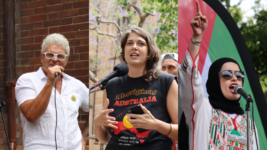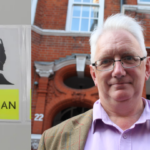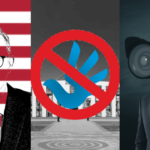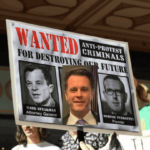Global Monitor Confirms Civil Liberties Continue to Wane Under Albanese

A global rights monitor has recently released its new country brief on Australia, and it confirms that the last two years of federal Labor government have not improved basic freedoms in the civic space, and instead, rights and liberties continued to decline under PM Anthony Albanese.
In 2019, CIVICUS downgraded Australia from its previous rating as an “open” society to one where the civic space had “narrowed”. And back then the rights monitor warned that Australia had seen the “most alarming deterioration in civic space” in the Indo Pacific, and it was only one of seven nations out of 196 assessed globally to have been in decline.
This was back in the Morrison government days and it was nearing a decade of Coalition rule, with the notorious trio of whistleblower prosecutions having just been launched the year prior, and the Pentecostal PM was raving about his Religious Discrimination Bill 2019, which was a human rights nightmare.
Indeed, this warning that the civic space, “the bedrock of any open and democratic society”, was being encroached upon was no mere appraisal to be dismissed, as CIVICUS is a “global civil society alliance”, involving numerous organisations, which has been making evaluations on the civic space in countries across the planet since 1993.
And this closing of the Australian civic space has continued in the exact same manner as it was under Morrison half a decade ago, which involved then, as it does now, the “targeting of whistleblowers, antiprotest laws, press freedom, the right to privacy and increased surveillance”.
Albanese drives it like a Liberal
“CIVICUS remains concerned about ongoing restrictions on civic freedoms, including the prosecution of whistleblowers, the disruption of and restrictions on peaceful protests and the criminalisation of climate and environmental activists and people protesting about the conflict in Gaza,” the report opens, adding that state antiprotest laws and press freedoms restrictions are further concerns.
The monitor outlines that the continuation of the decline in the civic space under Albanese sees the undermining of “freedoms of expression and peaceful assembly” that are protected under the International Covenant on Civil and Political Rights, which this nation is a party to, and he’s also failed to apply any of the recommendations made by the 2021 UNHRC Universal Periodic Review.
The assessment of the United Nations Human Rights Council called for the repeal of the draconian national security laws that have increasingly plagued the Australian polity ever since the 9/11 New York terror attacks, and it also called on the government to specifically revoke these types of measures when they could be used in regard to target journalists and public interest reporting.
“Australia has no comprehensive federal level fundamental human rights instrument to protect human rights in law, including civic freedoms,” CIVICUS makes clear in concluding the introduction to its country brief. Indeed, our nation is the only western democracy that doesn’t have national laws protecting the rights of citizens and residents.
The monitor does note, however, that the Parliamentary Joint Committee on Human Rights delivered a report on Australia’s rights framework in May, which first and foremost recommended that a Human Rights Act be passed into law. Yet, as has becoming increasingly clear over the past two years, the current administration is good at promising, especially when it has no intention of delivering.
Persecuting whistleblowers
CIVICUS notes several key areas which have declined under federal Labor, with the initial one being the persecution of whistleblowers. In 2019, Witness K and Bernard Collaery were being prosecuted for exposing the bugging of the Timor-Leste government, David McBride was charged over revealing war crimes, while Richard Boyle was facing 66 charges for calling out a dodgy tax practice.
But as Labor came to power, Witness K had already pleaded guilty, and new attorney general Mark Dreyfus dropped the prosecution against Collaery, who wasn’t actually a public service whistleblower like the rest of those being pursued. And as for McBride, he’s just spent his 100th day in prison, with a potential five years and eight month sentence ahead of him.
While Boyle, the man who followed all the stipulated whistle blowing rules was found to be protected in having made his public interest disclosure, so he didn’t break the law in revealing tax office protocol breaches to the press, but the state is continuing to pursue him over 24 charges that capture the way in which he gathered his evidence to support his case, as he’s not protected for that.
Cracking down on public assemblies
The CIVICUS briefing tracks the crackdown on protests that’s occurred over recent years, with the most dramatic being the laws passed by the NSW Liberal government in April 2022, which now sees demonstrators conducting unapproved protests that obstruct roads, bridges, tunnels or major facilities facing up to 2 years imprisonment and/or a $22,000 fine.
These laws emboldened the NSW police to crack down on climate protesters, which in the months following the roll out of the antiprotest regime saw a property staked out and then raided by police, as Blockade Australia was holding a meeting regarding future actions, while these laws also saw renowned climate defender Violet CoCo sentenced to 15 months prison and serve 13 days inside.
Rolled out in the last month of Morrison’s rule, the NSW antiprotest regime also influenced other states to implement their own draconian laws, under federal Labor. Both Victoria and Tasmania passed laws to prevent antilogging protests that carry up to 12 months for demonstrating in such a manner, while SA rolled out its own street protest laws last year that carry a three-month maximum.
And CIVICUS then explains that the clampdown on climate defenders has shifted onto those protesting the Israeli-perpetrated Gaza genocide, and while no one has spent any time in prison in regard to these protests, there has been a concerted effort on the part of the prime minister and other key politicians to criminalise them despite the nonviolent nature of the actions.
Wrong way, go back
CIVICUS makes quite a few recommendations regarding how Albanese could steer society in the direction of openness and restored rights. Although with terror levels being raised, a continuing effort to demonise Palestinian protests, the ongoing gaoling of those attempting to save the planet and a mere pretence about protecting whistleblowers on display, one shouldn’t hold one’s breath.
The first suggestion made by CIVICUS, as was the case with federal Labor’s human rights framework inquiry, is that Albanese pass a federal Human Rights Act. And while prioritising such a move would surely result in re-election, it’s quite unlikely that he’s going to progress such laws, as they’d infringe upon the way in which he’s running the country, with no consultation or care for the constituency.







